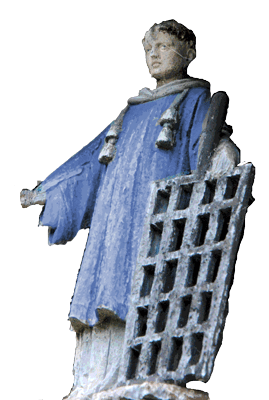
Welcome to St Laurence Church, Appleton with Besselsleigh
A welcoming and inclusive church serving the whole community

Welcome to St Laurence Church, Appleton with Besselsleigh
A welcoming and inclusive church serving the whole community
Week beginning Sunday 21 September 2025
Church Sunday: Year C, Proper 20
Readings: Amos 8.4-7; I Tim 2.1-7; Luke 16.1-13
The Parable of the Dodgy Steward tells the story of the cunning servant who uses his master’s money to secure his own future for the time after he’s been sacked for misusing his master’s money. It’s a difficult parable, full of contradictions, but the intended message is clear enough: just as he has spent his master’s goods to secure his own good, so disciples of Christ should spend their master’s goods (their own God-given wealth) to secure their own eternal good. The sense of urgency in all of this arises for the Steward because of his impending audit and dismissal, and for the Christian because of the surely certain Great Audit or Day of Judgement. Certain, though of unknown date.
Luke has been focusing on money for much of the last five chapters, steering us away from greed and persuading us that our money belongs to God. This should make us more humble, grateful and generous. Indeed, our donations become a sort of laying-down-of-our-lives in monthly instalments (John 15.13); a symbolic death-of-the-grain-of-wheat that leads to an abundant harvest (John 12.24); viz., the reward of eternal life, for of course whatever we do for the poorest we are doing for Christ himself (Matthew 25.40).
Generosity is also an effective antidote to avarice, saving us from the beguiling lure of money as source of power, pleasure and protection. Luke refers to this as ‘the Mammon of Wickedness’, presenting wealth as a sort of pagan idol that we can easily end up worshipping.
Anxiety about the Day of Judgement may not, it is true, be absolutely at the forefront of our thinking. Even if we believe in Christ, our heads are likely to be filled with ideas of cheap grace and superabundant Divine Mercy. Besides, a time of grievous economic hardship for many, and significant global unrest for all, is arguably not a time for telling people to focus on heaven, and to give all their money away.
Equally, one can say that for us humans whose lives are ever fragile and unpredictable, the Great Audit is always imminent, and every day is potentially year-end. What matters is that we manage to inject some of Saint Luke’s sense of urgency into our daily presumptions and practices so that even if life in an advanced economic structure forces us to be a little more circumspect with the pounds and pence, our hearts and minds may nonetheless be firmly fixed where true and eternal joys are to be found.
Generous almsgiving, in the end, is simply one of the marks of Christ-like behaviour, which ushers in the Kingdom of God another half-inch, and illumines our lives more brightly, so that the will of God may be seen and done on earth, as it is in heaven.
